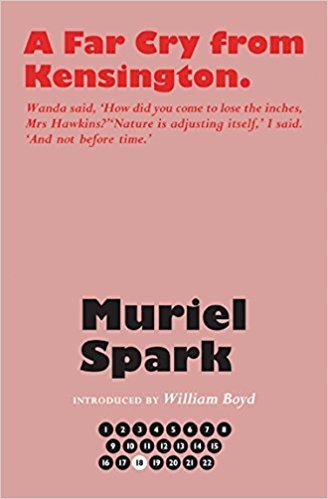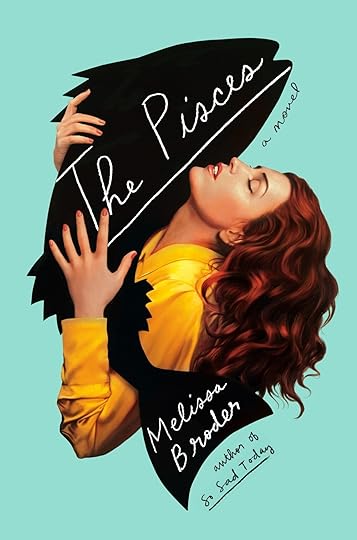February Wrap Up
What did you read in February?
The first book that I read in February was Devil-Land: England Under Siege, 1588-1688 by Clare Jackson, which I couldn't resist buying when I saw it reduced at Fox Lane Books.

Devil-Land walks the reader through a tumultuous period of English history, starting with the execution of Mary, Queen of Scots and ending with the ascension of William III and Mary II. What really makes this book worth reading, for someone already familiar with this period of time, is the focus on non-English perspectives. I would say that it’s a book that requires concentration, but I also found it a gripping read. My only caveat is that, although Jackson makes a convincing case for why this book focuses on what it does, the idea of England as “Devil-Land” never seemed to me to be comprehensively argued.
⭐⭐⭐⭐
I read my third Muriel Spark in February, after discovering this gorgeous centenary edition of A Far Cry from Kensington in a charity shop.

A Far Cry from Kensington starts out as an interesting but anecdotal read, as the narrator reminisces on how far she has come from when she was a young war widow, working in publishing, and living in a boarding house in Kensington. Gradually, the purpose and plot of the book begins to reveal itself. Muriel Spark's writing is a delight to read, even if a few of her comments make for uncomfortable reading. I found this book a little slow but compulsively readable, especially as the mystery at the heart of the book begins to reveal itself. Definitely an author I intend to explore further.
⭐⭐⭐⭐
After reading two books in a row that I'd only recently bought, I picked my next two books from my to-read shelf, starting with Snowflake by Louise Nealon.

Snowflake has a fairly basic plot at its heart, as a girl who has grown up on a farm in Kildare tries to fit in at Trinity College. But there is a lot going on in this one, including an unexpectedly fantasy-esque storyline which I don't think was explored as fully as it could have been. I found this coming-of-age novel an enjoyable read, which deals with issues of mental health in important and nuanced ways. But I also found it a little messy, with quite a disjointed structure and multiple storylines, not all of which I felt to be adequately resolved.
⭐⭐⭐⭐
In the mood for a thriller, I returned to an author I used to love: I've Got You Under My Skin by Mary Higgins Clark.

I've Got You Under My Skin opens with a man killing Laurie’s husband, and promising to kill Laurie and her son next. That threat is still hanging over her years later, when Laurie produces a TV programme that gathers together the suspects in an unsolved murder, in an attempt to finally reveal the truth. There are some predictable elements to this one, but the pages seemed to turn themselves. I especially enjoyed the chapters featuring the cold-case suspects, who all have something to hide.
⭐⭐⭐⭐
I'd been wanting to read more Thomas Mann ever since I finished Buddenbrooks, so in February I plucked up the courage to give Doctor Faustus a go.

Doctor Faustus purports to be a biography of a genius, a German composer whose life story is a reworking of the Faust legend (a man who sells his soul to the Devil), written by his friend towards the end of WWII. This is an incredible book, so rich in meaning, with so much to say, and I'm sure there is so much that I missed. I found it a challenging read which requires patience (it gets better the more you read), but it has left me wanting to read more Thomas Mann, and more about the kind of music he writes about.
⭐⭐⭐⭐⭐
After such a challenging read, the latest book in my favourite series, Encore in Death by J.D. Robb, was exactly what I needed next.

Encore in Death sees Eve Dallas, a Homicide lieutenant in a futuristic New York city, solving the murder of an actor seemingly beloved by everyone. This one is an interesting and twisty case, and I enjoyed the change of pace away from the usual action-filled endings. There are a few cringe-worthy lines, as we follow the lives of Dallas and those closest to her alongside the main plot, but the familiarity and sentimentality of this series are part of what make it so irresistible. That and the fact that the pages seem to turn themselves.
⭐⭐⭐⭐⭐
After reading quite a few long books in February, my next pick was a novella: The Girls of Slender Means by Muriel Spark.

The Girls of Slender Means focuses on the lives of the residents of a hostel for unmarried women (girls of slender means), in 1945 London. It’s an interesting, anecdotal book, full of colourful characters, which gradually reveals that there’s more to the story than first meets the eye. More a novella than a novel, this one manages to feel suggestive but not incomplete.
⭐⭐⭐⭐
The last book that I read in February was The Pisces by Melissa Broder, which had a cover and a premise too good to refuse.

The Pisces is set in LA, where Lucy is dog-sitting for her sister and trying to work through her personal and professional struggles. This story feels familiar in a lot of ways, especially in the glaring privilege of its protagonist, but it’s written in an interesting way, and makes for compulsive reading. Lucy's failing PhD thesis on Sappho was of particular interest to me, especially the way her thoughts on fragmentation and myth permeated the story, but this book has a lot of different interests, which it manages to weave together nicely.
⭐⭐⭐⭐
The first book that I read in February was Devil-Land: England Under Siege, 1588-1688 by Clare Jackson, which I couldn't resist buying when I saw it reduced at Fox Lane Books.

Devil-Land walks the reader through a tumultuous period of English history, starting with the execution of Mary, Queen of Scots and ending with the ascension of William III and Mary II. What really makes this book worth reading, for someone already familiar with this period of time, is the focus on non-English perspectives. I would say that it’s a book that requires concentration, but I also found it a gripping read. My only caveat is that, although Jackson makes a convincing case for why this book focuses on what it does, the idea of England as “Devil-Land” never seemed to me to be comprehensively argued.
⭐⭐⭐⭐
I read my third Muriel Spark in February, after discovering this gorgeous centenary edition of A Far Cry from Kensington in a charity shop.

A Far Cry from Kensington starts out as an interesting but anecdotal read, as the narrator reminisces on how far she has come from when she was a young war widow, working in publishing, and living in a boarding house in Kensington. Gradually, the purpose and plot of the book begins to reveal itself. Muriel Spark's writing is a delight to read, even if a few of her comments make for uncomfortable reading. I found this book a little slow but compulsively readable, especially as the mystery at the heart of the book begins to reveal itself. Definitely an author I intend to explore further.
⭐⭐⭐⭐
After reading two books in a row that I'd only recently bought, I picked my next two books from my to-read shelf, starting with Snowflake by Louise Nealon.

Snowflake has a fairly basic plot at its heart, as a girl who has grown up on a farm in Kildare tries to fit in at Trinity College. But there is a lot going on in this one, including an unexpectedly fantasy-esque storyline which I don't think was explored as fully as it could have been. I found this coming-of-age novel an enjoyable read, which deals with issues of mental health in important and nuanced ways. But I also found it a little messy, with quite a disjointed structure and multiple storylines, not all of which I felt to be adequately resolved.
⭐⭐⭐⭐
In the mood for a thriller, I returned to an author I used to love: I've Got You Under My Skin by Mary Higgins Clark.

I've Got You Under My Skin opens with a man killing Laurie’s husband, and promising to kill Laurie and her son next. That threat is still hanging over her years later, when Laurie produces a TV programme that gathers together the suspects in an unsolved murder, in an attempt to finally reveal the truth. There are some predictable elements to this one, but the pages seemed to turn themselves. I especially enjoyed the chapters featuring the cold-case suspects, who all have something to hide.
⭐⭐⭐⭐
I'd been wanting to read more Thomas Mann ever since I finished Buddenbrooks, so in February I plucked up the courage to give Doctor Faustus a go.

Doctor Faustus purports to be a biography of a genius, a German composer whose life story is a reworking of the Faust legend (a man who sells his soul to the Devil), written by his friend towards the end of WWII. This is an incredible book, so rich in meaning, with so much to say, and I'm sure there is so much that I missed. I found it a challenging read which requires patience (it gets better the more you read), but it has left me wanting to read more Thomas Mann, and more about the kind of music he writes about.
⭐⭐⭐⭐⭐
After such a challenging read, the latest book in my favourite series, Encore in Death by J.D. Robb, was exactly what I needed next.

Encore in Death sees Eve Dallas, a Homicide lieutenant in a futuristic New York city, solving the murder of an actor seemingly beloved by everyone. This one is an interesting and twisty case, and I enjoyed the change of pace away from the usual action-filled endings. There are a few cringe-worthy lines, as we follow the lives of Dallas and those closest to her alongside the main plot, but the familiarity and sentimentality of this series are part of what make it so irresistible. That and the fact that the pages seem to turn themselves.
⭐⭐⭐⭐⭐
After reading quite a few long books in February, my next pick was a novella: The Girls of Slender Means by Muriel Spark.

The Girls of Slender Means focuses on the lives of the residents of a hostel for unmarried women (girls of slender means), in 1945 London. It’s an interesting, anecdotal book, full of colourful characters, which gradually reveals that there’s more to the story than first meets the eye. More a novella than a novel, this one manages to feel suggestive but not incomplete.
⭐⭐⭐⭐
The last book that I read in February was The Pisces by Melissa Broder, which had a cover and a premise too good to refuse.

The Pisces is set in LA, where Lucy is dog-sitting for her sister and trying to work through her personal and professional struggles. This story feels familiar in a lot of ways, especially in the glaring privilege of its protagonist, but it’s written in an interesting way, and makes for compulsive reading. Lucy's failing PhD thesis on Sappho was of particular interest to me, especially the way her thoughts on fragmentation and myth permeated the story, but this book has a lot of different interests, which it manages to weave together nicely.
⭐⭐⭐⭐
Published on March 01, 2023 03:41
No comments have been added yet.



